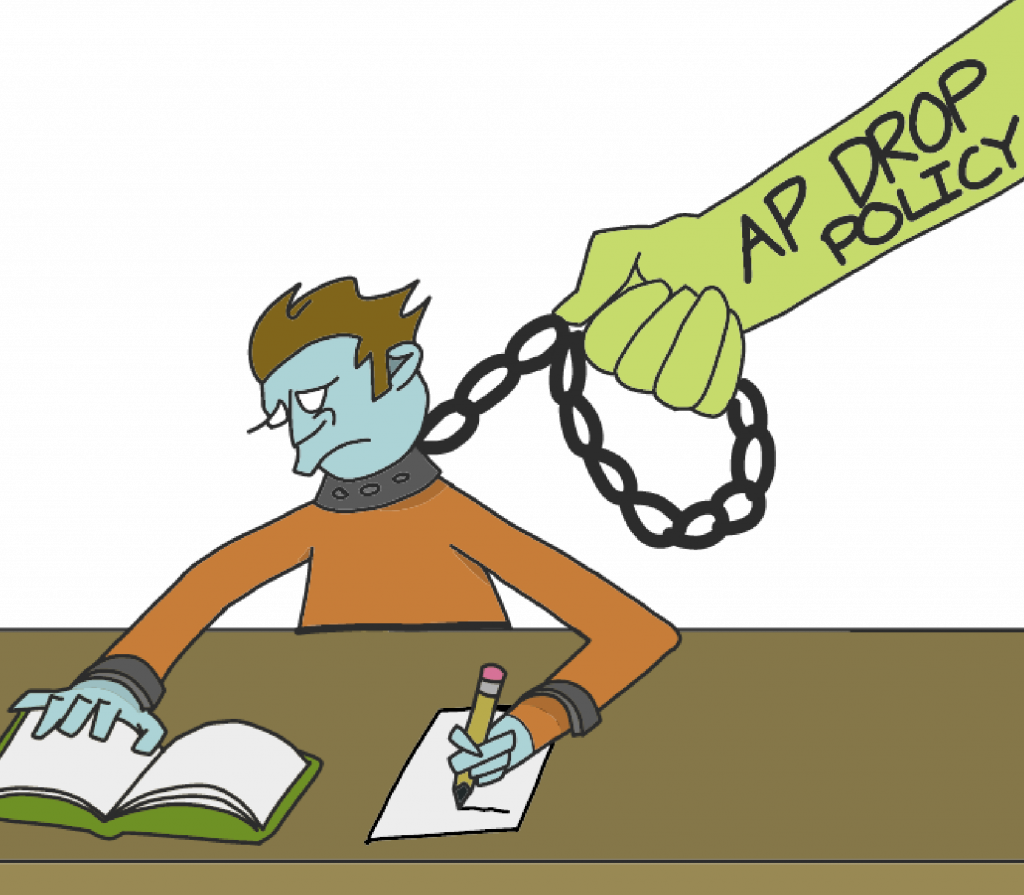
ILLUSTRATION BY ANDREW LAM
AP class drop policy fosters student failure
The AP class drop policy prohibits students from dropping their AP courses without a valid reason, meaning students are demonstrating strenuous effort but still performing poorly in the class. To drop an AP class, students must undergo a tedious process of completing a form, attending a parent conference with the principal, and receiving teacher approval for mere consideration. This unproductive policy desperately needs to be reformed as it harms students and teachers.
Teachers and the principal cannot possibly determine whether a student has a valid excuse for dropping a course. It is extremely arrogant of them to believe they know what is best for students rather than the student themselves and their parents. Other than identifying effort through homework completion and asking questions, teachers are unaware of the full picture. Students have their own lives, and they often involve personal issues that interfere with their performance in the class. Disregarding these factors when determining whether a student has a valid reason unreasonably forces students to commit to their classes.
Denying students to drop their AP class fosters poor mental health. If students find that the course is too demanding, they are forced to commit to it regardless. Students then are obligated to dedicate hours of rigorous studying for a class where they have no motivation or hope of succeeding. Consequently, this causes severe stress in students, leading to a lack of social life and participation in extracurriculars such as clubs and sports, which provides many benefits such as an enhanced self-esteem.
Due to unfitted students in AP classes, teachers are then compelled to slow their pacing in teaching in order to ensure everyone is learning and prepared for the AP exam. Since the college-level curriculum includes an abundance of material, slowing down will be detrimental for students. Students will not be able to obtain the best possible education, ultimately leaving them unprepared for the AP test. In addition, it is extremely unfair for the students suffering the consequences of having to slow down for students that are not suited nor want to be in the class. This could be easily avoided if the policy was revoked, or at the very least, sensible.
Although this policy was implemented to prevent empty classes as the amount of AP classes is determined by registration number, it is counterintuitive for the school to rather have the student fail than let them drop. In fact, it is hypocritical as the school’s purpose is to ensure students’ success. Despite open enrollment enabling all students to have the opportunity to take AP courses, many students want to challenge themselves and believe they are capable of taking AP classes, but realize they are not later on. This policy unjustifiably punishes and actively discourages students from attempting to excel academically.
Instead of enacting a policy, counselors need to make a more valiant effort when working with students before registration by approving whether they will be able to handle AP courses. The criteria for eligibility to register for an AP course cannot be demanding, but counselors cannot blindly allow students who have failing grades take AP courses. Although some students would be denied the opportunity to take an AP course, it is in their best interests. Furthermore, this will prevent empty classes as well as ensuring students’ success.